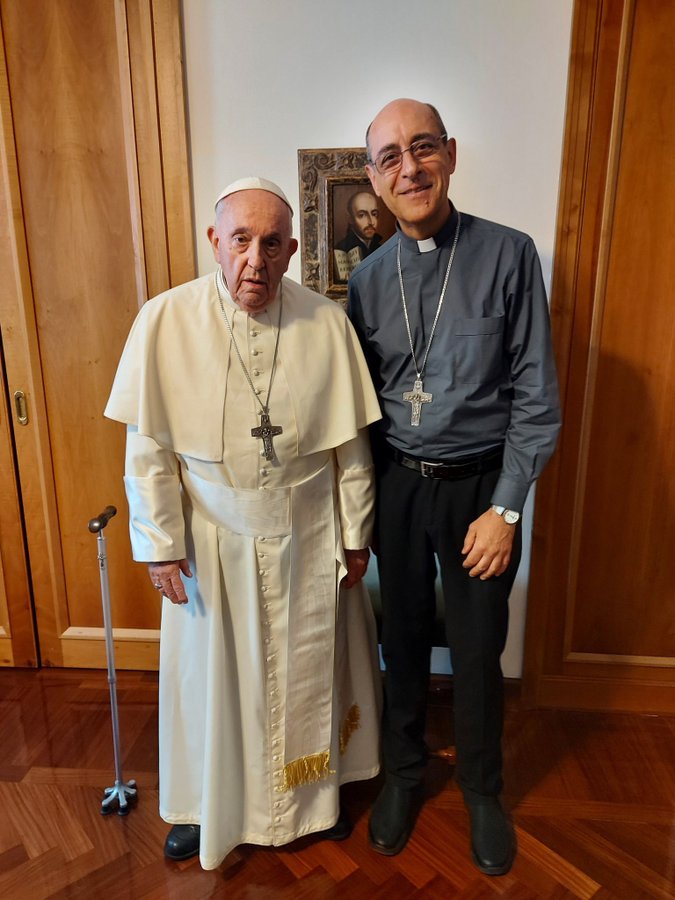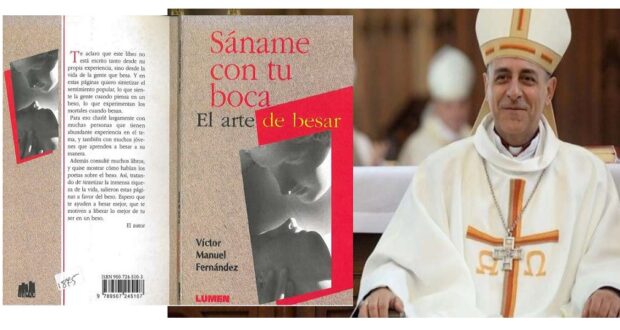فرنانديز وكتاب لاهوتي.. إشفني بفمك – فن التقبيل… صورًا تماثيل مخنثين بقبلون بعضهم..

مايكل هاينز Michael Haynes – أثار تعيين البابا فرانسيس رئيس الأساقفة الأرجنتيني فرنانديز في أعلى منصب عقائدي بالفاتيكان مخاوف بشأن دعمه للتواصل بين المطلقين و’المتزوجين مجددًا ‘، والترويج لأفعال مثيرة، والتقليل من أهمية تعاليم الكنيسة التي تعارض زواج المثليين”.
عين البابا فرانسيس رئيس الأساقفة المثير للجدل فيكتور مانويل فرنانديز من لا بلاتا رئيسًا جديدًا لمجمع عقيدة الإيمان (الآن ديكاستري) ، مع المحافظ الجديد المعروف بأدواره كصديق للبابا منذ فترة طويلة وعالم لاهوت ، و كاتب للعديد من النصوص البابوية بما في ذلك Amoris Laetitia.
أعلن المكتب الصحفي للكرسي الرسولي ، عند إصداره الخبر في 1 تموز (يوليو) ، أن البابا فرانسيس قد استدعى رئيس الأساقفة فرنانديز ليخلف الكاردينال المنتهية ولايته لويس لاداريا فيرير ، س.
فرنانديز البالغ من العمر 60 عامًا ، مثل فرانسيس، هو مواطن من الأرجنتين ونشأ ليصبح رئيس أساقفة في 13 مايو 2013 ، بعد شهرين فقط من البابوية الجديدة. تعود علاقتهما الوثيقة إلى زمن فرانسيس كأساقفة في الأرجنتين، حيث قدم الكاردينال بيرغوليو آنذاك المشورة لفرنانديز بشأن خياراته المهنية الكتابية.
أدى ذلك إلى إحضار بيرغوليو فرنانديز إلى المؤتمر العام الخامس لأساقفة أمريكا اللاتينية لعام 2007 بصفته حاضراً أو خبيرًا.
ثم تم ترشيحه من قبل بيرجوليو للعمل كرئيس للجامعة البابوية الكاثوليكية في الأرجنتين في عام 2009 ، لكنه انضم إلى المنصب فقط في عام 2011 بعد الانتهاء من الاستجواب والرد على اعتراضات CDF مجمع عقيدة والإيمان. ورد أن معاملة مجمع العقيدة والإيمان لفرنانديز أغضبت بيرغوليو في ذلك الوقت.
ظهرت الكثير من التكهنات في ديسمبر ويناير بشأن الترشيح المحتمل للأسقف الألماني هاينر ويلمر كرئيس جديد لقوات الدفاع المدني. كان البابا فرانسيس قد اعتبر في الواقع ترشيح ويلمر ، ولكن تم منعه من قبل العديد من الكرادلة الذين تدخلوا مع الفاتيكان لعدم تحديد الموعد.
وسيتولى فرنانديز الآن دوره الجديد كرئيس لمكتب الكنيسة العقائدي في منتصف سبتمبر. مع وجود فرنانديز الآن في منصب رئيس CDF ، تشمل قائمته ، كما تم توسيعها في المقالة أدناه:
- الترويج والدفاع المتحمس للسماح بالقربان للمطلقات و “المتزوجات”.
- الترويج العام للتقبيل والأفعال المثيرة.
- التقليل من أهمية الحاجة لمعارضة زواج المثليين.
- بيان كيف أنه أكثر تقدمية من البابا في بعض القضايا.
الحليف البابوي الرئيسي والكاتب الشبح
لطالما قاد فرانسيس مسيرة فرنانديز المهنية ، قبل وبعد صعود فرانسيس إلى العرش البابوي. لم ينمو هذا الرابط الحميم إلا منذ 13 مارس 2013 ، مع الاعتراف بفرنانديز الآن على نطاق واسع بأنه “كاتب أساسي” لفرانسيس و “عالم لاهوت موثوق به”.
يتضمن ذلك كتابته لـ Evangelii Gaudium و Laudato Sí و Amoris Laetitia المثير للجدل للغاية.
لا ينبغي أن يكون دوره في كتابة Amoris Laetitia غير متوقع: في الواقع ، أعطى البابا فرانسيس فرنانديز أدوارًا رئيسية في إدارة مجامع الفاتيكان 2014 و 2015 مما أدى إلى الإرشاد الرسولي المثير للجدل.
فتح الفصل 8 سيئ السمعة من Amoris Laetitia الباب للسماح للمطلقات و “المتزوجات مجددًا” بالحصول على القربان المقدس. سرعان ما أجاب فرانسيس على الأسئلة بالقول “لا يوجد تفسير آخر” لـ Amoris Laetitia باستثناء ذلك الذي قدمه أساقفة بوينس آيرس الذي يسمح بالتواصل للمطلقين والمتزوجين مرة أخرى.
سُئل فرانسيس لاحقًا أيضًا عما إذا كان Amoris Laetitia يحتوي على “تغيير في الانضباط الذي يحكم الوصول إلى الأسرار المقدسة” للكاثوليك المطلقين و “المتزوجين من جديد”. فأجاب: “أستطيع أن أقول نعم ، فترة“. في غضون أشهر ، أصدرت مجموعة من العلماء الكاثوليك رسالة إلى جميع الكرادلة والبطاركة، حذرت فيها من أن أموريس لاتيتيا تحتوي على “مخاطر على الإيمان“.
يعتقد أن فرنانديز هو المسؤول الرئيسي عن الخطوط التي أدت إلى الكثير من الذعر بين الكاثوليك المؤمنين. لدرجة أن الصحفي الفاتيكاني المخضرم ساندرو ماجستر سلط الضوء على أن المقاطع النصية الأكثر إثارة للجدل كانت في الواقع تعكس بشكل وثيق كتابات فرنانديز الخاصة من السنوات السابقة عندما كان في الأرجنتين.
في دفاعه الشخصي عن الإرشاد الرسولي ، قال فرنانديز:
من المشروع أيضًا التساؤل عما إذا كانت أفعال العيش معًا أكثر خطورة [أي يجب أن تندرج العلاقات الجنسية] دائمًا ، بمعناها المتكامل ، ضمن المبدأ السلبي لـ “الزنا” … يمكن أن يكون هناك طريق للتمييز على إمكانية تلقي طعام القربان المقدس … أقول ، “بمعناها المتكامل..
كتب فيرنانديز أن “الابتكار العظيم لفرانسيس هو السماح للتمييز الرعوي..
ترحيب البابا
أصدر خطاب ترحيب إلى محافظ CDF القادم ، وأشاد به البابا فرانسيس باعتباره “شقيقًا” ، حيث كتب أن “الغرض المركزي من CDF هو حماية التعليم الذي ينبع من الإيمان من أجل” إعطاء سبب لأملنا ، ولكن ليس كـ”الأعداء الذين يشيرون ويدينون “.
أدان فرانسيس CDF ، قائلاً إنه “في أوقات أخرى [كان] يستخدم أساليب غير أخلاقية. كانت تلك الأوقات التي تمت فيها متابعة الأخطاء العقائدية المحتملة بدلاً من تعزيز المعرفة اللاهوتية. ما أتوقعه منك هو بالتأكيد شيء مختلف تمامًا “.
نقلاً عن Evangelii Gaudium ، حث فرانسيس فرنانديز على الاعتراف بأن الكنيسة “تحتاج إلى النمو في تفسيرها للكلمة الموحاة وفي فهمها للحقيقة”، مضيفًا:
نحن بحاجة إلى طريقة تفكير يمكنها أن تقدم بشكل مقنع إلهًا يحب ، ويغفر ، ويخلص ، ويحرر ، ويرقي الناس ويدعوهم إلى الخدمة الأخوية.
بالأمس فقط ، نشر فرنانديز صورة على الإنترنت وهو يقف بجانب البابا ، يمدح البابا لأخلاقيات عمله بعد أن أمضى “أسبوعًا” مع فرانسيس.
فرناديز وفرانسيس معا ضد العقيدة
في عام 2015 ، أشاد فرنانديز بحبرية البابا فرانسيس ، بحجة أنه “لا عودة إلى الوراء” عن مسار أفعاله. “على سبيل المثال ، البابا مقتنع بأن الأشياء التي كتبها أو قالها بالفعل لا يمكن إدانتها على أنها خطأ. لذلك، يمكن لأي شخص في المستقبل أن يكرر هذه الأشياء دون خوف من التعرض للعقاب “.
قال فرنانديز بشكل منفصل:
يسير البابا بطيئًا لأنه يريد أن يتأكد من أن التغييرات لها تأثير عميق. الوتيرة البطيئة ضرورية لضمان فاعلية التغييرات … عليك أن تدرك أنه يهدف إلى إصلاح لا رجوع فيه. إذا شعر في يوم من الأيام أن الوقت ينفد ولم يكن لديه ما يكفي من الوقت لفعل ما يطلبه منه الروح ، فيمكنك أن تكون على يقين من أنه سوف يسرع “.
حتى أن فرنانديز صرح علانية كيف “في العديد من القضايا أنا أكثر تقدمية بكثير من البابا“.
في الواقع ، أصبح دور فرنانديز في صياغة Amoris Laetitia الآن أكثر أهمية من أي وقت مضى. منذ أيام فقط ، تم إصدار أحدث وثيقة ترشد سينودس الأساقفة القادم في أكتوبر.
أثناء الترويج لقضايا المثليين والأيديولوجيات بشكل كبير ، دفعت الوثيقة (Instrumentum Laboris IL) التفسير المقبول على نطاق واسع والموافق عليه بابويًا لـ Amoris Laetitiae الذي يسمح للمطلقين و “المتزوجين من جديد” بالمناولة المقدسة كمسألة تم الانتهاء منها بالفعل. تنص الوثيقة على:
بعض الأسئلة التي نشأت من استشارة شعب الله تتعلق بقضايا يوجد فيها تعليم تعليمي ولاهوتي يجب أن يؤخذ في الاعتبار. لإعطاء مثالين فقط ، يمكننا أن نلاحظ قبول المطلقات المتزوجات مرة أخرى ، والتي تم تناولها في الإرشاد الرسولي لما بعد السينودس Amoris laetitia ، أو الانغماس في الليتورجيا ، موضوع تعليم Varietates legalimae (1994) لمجمع العبادة الإلهية ونظام الأسرار. حقيقة أن الأسئلة تستمر في الظهور حول قضايا مثل هذه لا ينبغي تجاهلها على عجل ، بل إنها تستدعي التمييز ، والجمعية السينودسية هي منبر متميز للقيام بذلك.
على مدى مراحل عديدة حتى الآن ، كان السينودس حول السينودس متسقًا في دفعه من أجل “الترحيب” بـ “المطلقات المتزوجات من جديد ، والأشخاص الذين يتزوجون من تعدد الزوجات ، والمثليات والمثليين ومزدوجي الميل الجنسي ومغايري الهوية الجنسانية والخناثى“. الآن ، تروج أحدث وثيقتها للتعاليم المناهضة للكاثوليكية لـ Amoris Laetitia بالسماح للمطلقين و “المتزوجين مجددًا” بالحصول على القربان ، في الوقت الذي سيتولى فيه مؤلف تلك الوثيقة أحد أعلى المناصب في الكنيسة الكاثوليكية ، كرئيس للكنيسة الكاثوليكية. مكتب الكنيسة العقائدي.
علاوة على ذلك ، كشف كاردينال الفاتيكان الرئيسي قبل بضعة أسابيع أن الفاتيكان في مراحل إعداد وثيقة حول المطلقين و “المتزوجين” تماشياً مع رغبات البابا فرانسيس. صرح الكاردينال كيفين فاريل ، محافظ ديكاستري للعلم والأسرة والحياة ، في أبريل / نيسان كيف “تعمل المديرية على إعداد نص خاص – كما تمنيت ، أيها القداسة – بالرجال والنساء الذين فشل زواجهم وراءهم ، العيش في نقابات جديدة “.
كان فاريل أيضًا مروجًا ثابتًا ومتحمسًا لـ Amoris Laetitia ، موضحًا كيف “أؤمن بشدة بأن [Amoris Laetitia] هو تعليم الكنيسة. هذه وثيقة رعوية تخبرنا كيف يجب أن نمضي قدماً. أعتقد أننا يجب أن نأخذ الأمر كما هو “.
في المقابل ، دافع فاميليريس كونسورتيو للبابا يوحنا بولس الثاني عن تعاليم الكنيسة الكاثوليكية القديمة القائلة بأن المطلقين الذين تزوجوا مرة أخرى والذين لم تعلن الكنيسة أن اتحاداتهم السابقة باطلة قد لا يتلقون القربان المقدس. كتب يوحنا بولس الثاني:
تؤكد الكنيسة على ممارستها ، القائمة على الكتاب المقدس ، في عدم قبول المطلقين الذين تزوجوا من جديد في القربان الإفخارستي. لا يمكن قبولهم بسبب حقيقة أن حالتهم وظروف حياتهم تتعارض بشكل موضوعي مع وحدة الحب بين المسيح والكنيسة التي تدل عليها وتنفذها الإفخارستيا. إلى جانب هذا ، هناك سبب رعوي خاص آخر: إذا تم قبول هؤلاء الناس في الإفخارستيا ، فإن المؤمنين سيقعون في الخطأ والارتباك فيما يتعلق بتعاليم الكنيسة حول عدم انحلال الزواج.
فن التقبيل والزواج من نفس الجنس
في حين أن الفاتيكان أدرج العديد من الكتب والأعمال المكتوبة لفرنانديز ، فقد كان عمله في عام 1995 “اشفيني بفمك: فن التقبيل” مفقودًا من القائمة. دفاعًا عن الكتاب ، صرح فرنانديز أن:
[في] هذه الصفحات أريد تجميع المشاعر الشعبية ، ما يشعر به الناس عندما يفكرون في قبلة، ما يختبرونه عندما يقبلون … لذا ، في محاولة لتوليف الثراء الهائل للحياة ، ظهرت هذه الصفحات لصالح التقبيل. آمل أن يساعدوك على التقبيل بشكل أفضل ، وأن يحفزوك على إطلاق أفضل ما لديك في قبلة.
ومع ذلك ، كما أفاد موقع LifeSite سابقًا ، بينما دافع فرنانديز عن الكتاب باعتباره تحليلًا للتقبيل الذي يزعم أنه عمل روحي ولاهوتي ، فهو مثير للإثارة بشكل لا لبس فيه وغالبًا ما يوحي بعلاقات جنسية غامضة يكون فيها جنس المشاركين غير محدد. يحتوي الكتاب أيضًا على صور مختلفة للتماثيل والأعمال الفنية التي تصور الناس يقبلون ويحتضنون بعضهم البعض في مواقف حميمة ومثيرة.
بالإضافة إلى الشعر والشعر المثير حول التقبيل ، يحتوي الكتاب على نصائح حول كيفية جعل جسد المرء أكثر جاذبية للآخر عند الانخراط في قبلة حميمة.
ومع ذلك ، لا تقتصر آراء فرنانديز غير الأرثوذكسية والكاتوليكية على الترويج للأدب الصريح. تم تسجيله في السجلات العامة على أنه يقلل من أهمية الحاجة إلى معارضة “زواج” المثليين ، حيث صرح في عام 2014 أن:
… على سبيل المثال ، ليس من الجيد معارضة زواج المثليين لأن الناس يميلون إلى رؤيتنا كمجموعة من الأفراد المستائين والقاسيين وغير الحساسين والمبالغة في التقدير. إن الحديث عن جمال الزواج وانسجام الاختلافات التي تشكل جزءًا من تحالف بين الرجل والمرأة أمر مختلف تمامًا. يتحدث هذا السياق الإيجابي عن نفسه عندما يتعلق الأمر بإظهار أن استخدام نفس المصطلح “زواج” لوصف الاقتران من نفس الجنس ، غير مناسب.
يبقى الآن أن نرى ما هو تأثير الترويج العام والمتسق لفرنانديز للتعاليم المناهضة للكاثوليكية على حياة الكاثوليك في جميع أنحاء العالم.
Pope appoints long-time ally and ghostwriter of Amoris Laetitia as new Vatican doctrine chief
Michael Haynes – Pope Francis’ appointment of Argentinian Archbishop Fernández to the Vatican’s top doctrinal position has raised concerns over his support for Communion for the divorced and ‘re-married,’ promotion of erotic actions, and downplaying Church teaching opposing same-sex ‘marriage.’
Pope Francis has appointed the highly controversial Archbishop Victor Manuel Fernández of La Plata as new Prefect of the Congregation for the Doctrine of the Faith (now Dicastery), with the new prefect known for his roles as the Pope’s long-time friend and theologian, and ghost writer of numerous papal texts including Amoris Laetitia.
Issuing the news July 1, the Holy See Press Office stated that Pope Francis had called Archbishop Fernández to succeed the outgoing Cardinal Luis Ladaria Ferrer, S.J., who has come to the “conclusion of his mandate,” having held the position since 2017.
The 60-year-old Fernández, like Francis, is a fellow native of Argentina and was raised to become archbishop on May 13, 2013, just two months into the new pontificate. Their close relationship dates back to Francis’ time as a prelate in Argentina, with then-Cardinal Bergoglio giving Fernandez advice on his clerical career choices.
This resulted in Bergoglio bringing Fernández to the 2007 Fifth General Conference of the Latin American Bishops as a peritus, or expert.
He was then nominated by Bergoglio to serve as rector of the Pontifical Catholic University of Argentina in 2009, but only acceded to the post in 2011 after completing questioning and answering objections from the CDF. The CDF’s treatment of Fernández reportedly angered Bergoglio at the time.
Much speculation emerged in December and January regarding the possible nomination of heterodox German Bishop Heiner Wilmer as the new CDF head. Pope Francis had in fact considered Wilmer’s nomination, but was blocked by several cardinals who intervened with the Vatican not to make the appointment.
Fernández will now assume his new role as head of the Church’s doctrinal office in mid-September. With Fernández now in position at the head of the CDF, his roster includes, as expanded upon in the article below:
– Ardent promotion and defense of Amoris Laetitia opening the door to Communion for the divorced and “re-married.”
– Public promotion of erotic kissing and actions.
– Downplaying of need to oppose same-sex marriage.
– Stating how he is more progressive than the Pope on certain issues.
Key papal ally and ghostwriter
Fernández’s career has been long been guided by Francis, both before and after Francis’ ascent to the papal throne. This intimate link has only grown since March 13, 2013, with Fernández now being widely acknowledged as Francis’ “primary ghostwriter” and “trusted theologian.”
This includes his ghost-writing of Evangelii Gaudium, Laudato Sí, and the highly controversial Amoris Laetitia.
His role in writing Amoris Laetitia should not be unexpected: indeed, Pope Francis had given Fernández key roles in the running of the 2014 and 2015 Vatican synods which led to the controversial apostolic exhortation.
Amoris Laetitia’s now infamous Chapter 8 opened the door to allowing the divorced and “re-married” access to receive Holy Communion. Francis soon responded to questions by saying there is “no other interpretation” of Amoris Laetitiaexcept the one provided by the bishops of Buenos Aires allowing Communion for the divorced and remarried.
Francis was subsequently also asked if Amoris Laetitia contained a “change in discipline that governs access to the sacraments” for Catholics who are divorced and “re-married.” He replied, “I can say yes, period.” Within months, a group of Catholic scholars issued a letter to all the cardinals and patriarchs, warning that Amoris Laetitia contained “dangers to the faith.”
It is Fernández who is believed to be chiefly responsible for the lines which have led to so much consternation amongst faithful Catholics. So much so, that veteran Vatican journalist Sandro Magister highlighted how the most controversial passages of text were in fact very closely mirroring Fernández’s own writings from years prior when in Argentina.
In his personal defense of the apostolic exhortation, Fernández argued that:
It is also licit to ask if acts of living together more uxorio [i.e. having sexual relations] should always fall, in its integral meaning, within the negative precept of ‘fornication’… there can be a path of discernment open to the possibility of receiving the food of the Eucharist… I say, ‘in its integral meaning,’ because one cannot maintain those acts in each and every case are gravely dishonest in a subjective sense.
Francis’ “great innovation is to allow for a pastoral discernment in the realm of the internal forum to have practical consequences in the manner of applying the discipline,” wrote Fernández.
Papal welcome
Issuing a letter of welcome to the incoming CDF prefect, Pope Francis hailed him as “brother,” writing the CDF’s “central purpose is to guard the teaching that flows from the faith in order to ‘give a reason for our hope, but not as enemies who point out and condemn.’”
Francis condemned the CDF, saying that “in other times [it] came to use immoral methods. Those were times when, rather than promoting theological knowledge, possible doctrinal errors were pursued. What I expect from you is certainly something very different.”
Quoting from Evangelii Gaudium, Francis urged Fernández to recognize that the Church “needs to grow in her interpretation of the revealed Word and in her understanding of truth,” adding:
We need a way of thinking that can convincingly present a God who loves, who forgives, who saves, who liberates, who promotes people and calls them to fraternal service.
Only yesterday, Fernández had posted a picture online standing alongside the Pope, praising the pontiff for his work ethic after having spent “a week” with Francis.
Fernadez and Francis jointly pushing against doctrine
In 2015, Fernández praised Pope Francis’ pontificate, arguing that “No, there’s no turning back” from his course of actions. “For example, the Pope is convinced that the things he’s already written or said cannot be condemned as an error. Therefore, in the future anyone can repeat those things without fear of being sanctioned,” he stated.
Separately, Fernández said:
The Pope goes slow because he wants to be sure that the changes have a deep impact. The slow pace is necessary to ensure the effectiveness of the changes… You have to realize that he is aiming at reform that is irreversible. If one day he should sense that he’s running out of time and doesn’t have enough time to do what the Spirit is asking him, you can be sure he will speed up.”
Fernández has even openly stated how “in many issues I am far more progressive than the Pope.”
Indeed, Fernández’s role in drafting Amoris Laetitia is now more topical than ever before. Only days ago, the latest document set to guide the upcoming Synod of Bishops in October was released.
While promoting LGBT issues and ideology heavily, the document (Instrumentum Laboris IL) pushed the widely accepted, and papally approved, interpretation of Amoris Laetitiae allowing the divorced and “re-married” to Holy Communion as an already finalized issue. The document states:
Some of the questions that emerged from the consultation of the People of God concern issues on which there is already magisterial and theological teaching to be considered. To give just two examples, we can note the acceptance of remarried divorcees, dealt with in the Post-Synodal Apostolic Exhortation Amoris laetitia, or the inculturation of the liturgy, the subject of the Instruction Varietates legitimae (1994) of the Congregation for Divine Worship and the Discipline of the Sacraments. The fact that questions continue to emerge on issues like these should not be hastily dismissed, rather, it calls for discernment, and the Synodal Assembly is a privileged forum for so doing.
Over its many stages so far, the Synod on Synodality has been consistent in its push for a need to “welcome” the “remarried divorcees, people in polygamous marriages, LGBTQ+ people.” Now, its latest document promotes the anti-Catholic teaching of Amoris Laetitia in allowing the divorced and “re-married” to receive Communion, at the time when that document’s author will assume one of the highest offices in the Catholic Church, as head of the Church’s doctrinal office.
Furthermore, a key Vatican cardinal revealed some weeks ago that the Vatican is in the stages of drafting a document on the divorced and “re-married” in line with the wishes of Pope Francis. Cardinal Kevin Farrell, prefect of the Dicastery for Laity, Family, and Life, stated in April how “the dicastery is working on the preparation of a text specifically regarding – as you wished, Holiness – men and women who, having marriage failure behind them, live in new unions.”
Farrell has also been a consistent and ardent promoter of Amoris Laetitia, stating how “I firmly believe [Amoris Laetitia] is the teaching of the Church. This is a pastoral document telling us how we should proceed. I believe we should take it as it is.”
In contrast, Pope John Paul II’s Familiaris Consortio championed the Catholic Church’s longstanding teaching that the divorced and remarried whose previous unions the Church has not declared null may not receive Holy Communion. John Paul II wrote:
[The] Church reaffirms her practice, which is based upon Sacred Scripture, of not admitting to Eucharistic Communion divorced persons who have remarried. They are unable to be admitted thereto from the fact that their state and condition of life objectively contradict that union of love between Christ and the Church which is signified and effected by the Eucharist. Besides this, there is another special pastoral reason: if these people were admitted to the Eucharist, the faithful would be led into error and confusion regarding the Church’s teaching about the indissolubility of marriage.
Art of Kissing’ and same-sex ‘marriage’
While the Vatican listed numerous books and written works of Fernández’s, notably missing from the list was his 1995 work “Heal me with your mouth: The art of kissing.” Defending the book, Fernández stated that:
[In] these pages I want to synthesize the popular feeling, what people feel when they think of a kiss, what they experience when they kiss… So, trying to synthesize the immense richness of life, these pages emerged in favor of kissing. I hope that they help you kiss better, that they motivate you to release the best of yourself in a kiss.
Yet as LifeSite reported previously, while Fernández defended the book as an analysis of kissing that purports to be a spiritual and theological work, it is unmistakably erotic and often suggestive of ambiguous sexual relationships in which the genders of the participants are unspecified. The book also contains various photos of statues and artworks depicting people passionately kissing and embracing one another in intimate and erotic positions.
In addition to erotic poetry and verse about kissing, the book contains advice on how to make one’s body more attractive to another when engaging in an intimate kiss.
Fernández’s heterodox views are not limited to promoting of explicit literature, however. He is on public record as downplaying the need to oppose same-sex “marriage,” stating in 2014 that:
… there also needs to be reference to a context close to home, that is always positive in light of what is being considered or proposed. For example, it is no good opposing same-sex marriage because people tend to see us as a group of resentful, cruel, insensitive, over-the-top even, individuals. It is an entirely different thing to talk about the beauty of marriage and the harmony of differences that form part of an alliance between a man and woman. This positive context speaks for itself when it comes to showing that the use of the same term ‘marriage’ to describe same-sex unions, in unsuitable.
It now remains to be seen what impact Fernández’s public and consistent promotion of anti-Catholic teaching will have upon the life of Catholics around the globe.
 Agoraleaks Agoraleaks
Agoraleaks Agoraleaks







